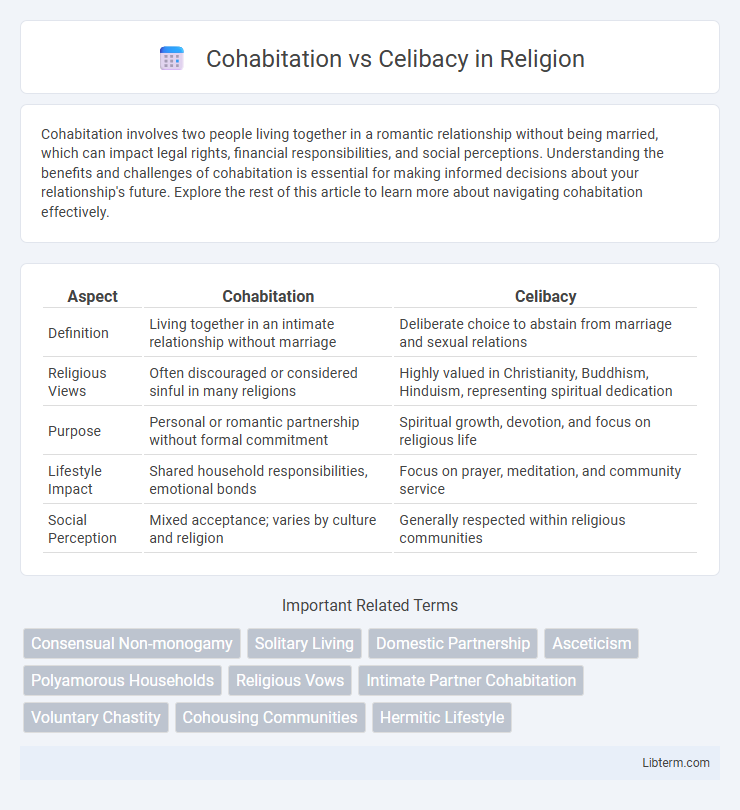Cohabitation involves two people living together in a romantic relationship without being married, which can impact legal rights, financial responsibilities, and social perceptions. Understanding the benefits and challenges of cohabitation is essential for making informed decisions about your relationship's future. Explore the rest of this article to learn more about navigating cohabitation effectively.
Table of Comparison
| Aspect | Cohabitation | Celibacy |
|---|---|---|
| Definition | Living together in an intimate relationship without marriage | Deliberate choice to abstain from marriage and sexual relations |
| Religious Views | Often discouraged or considered sinful in many religions | Highly valued in Christianity, Buddhism, Hinduism, representing spiritual dedication |
| Purpose | Personal or romantic partnership without formal commitment | Spiritual growth, devotion, and focus on religious life |
| Lifestyle Impact | Shared household responsibilities, emotional bonds | Focus on prayer, meditation, and community service |
| Social Perception | Mixed acceptance; varies by culture and religion | Generally respected within religious communities |
Understanding Cohabitation and Celibacy
Cohabitation involves partners living together in a committed relationship without marriage, often sharing financial responsibilities and daily routines. Celibacy is the voluntary choice to abstain from sexual activity, frequently motivated by religious, personal, or health reasons. Understanding cohabitation requires examining social, legal, and psychological impacts, whereas celibacy emphasizes self-discipline and lifestyle commitment.
Historical Perspectives on Relationship Choices
Historical perspectives on relationship choices reveal that cohabitation and celibacy have served distinct social and cultural functions across civilizations. Cohabitation often emerged as a pragmatic approach to partnership and economic survival, evident in ancient Roman and indigenous societies where living together outside formal marriage was common. Celibacy, deeply rooted in religious and philosophical traditions such as early Christian monasticism and Hindu asceticism, was valued for spiritual purity and societal dedication, influencing personal relationship decisions throughout history.
Psychological Effects of Cohabitation
Cohabitation often influences psychological well-being by enhancing emotional support and intimacy, which can reduce stress and increase overall life satisfaction. Studies show cohabiting individuals tend to experience higher levels of companionship and decreased feelings of loneliness compared to those practicing celibacy. However, the uncertainty and social stigma linked to cohabitation in certain cultures may contribute to anxiety and relational strain.
Psychological Effects of Celibacy
Celibacy can lead to increased self-awareness and emotional resilience by fostering introspection and personal growth. Psychological effects also include reduced stress and anxiety levels due to the absence of relationship conflicts and sexual pressures. However, prolonged celibacy may cause feelings of loneliness or social isolation if not accompanied by a strong support network.
Social Acceptance and Cultural Attitudes
Social acceptance of cohabitation has surged in many Western societies, reflecting shifting cultural attitudes that value personal freedom and pragmatic relationship choices over traditional marriage norms. In contrast, celibacy remains respected primarily within religious and spiritual contexts, often viewed as a disciplined lifestyle choice rather than a social norm. Cultural attitudes towards cohabitation and celibacy are heavily influenced by regional beliefs, with more conservative societies favoring celibacy or marriage, while progressive cultures embrace cohabitation as a valid form of partnership.
Impact on Personal Growth and Identity
Cohabitation allows individuals to explore relationship dynamics and develop communication skills, fostering emotional intelligence and self-awareness through shared experiences. Celibacy promotes introspection and self-discipline, enabling deeper personal reflection and a clearer understanding of one's values and identity without external influences. Both lifestyles significantly influence personal growth by shaping emotional maturity and self-concept in distinct ways.
Financial Implications of Living Together vs. Living Alone
Cohabitation often results in shared living expenses, such as rent, utilities, and groceries, reducing the financial burden for each partner compared to living alone. Couples living together can benefit from combined incomes and cost-sharing, leading to greater savings potential and improved financial stability. Conversely, celibacy or living alone entails bearing all household costs independently, which typically results in higher per-person expenses and limited financial flexibility.
Legal Considerations in Cohabiting Relationships
Cohabiting couples face distinct legal considerations compared to married couples, lacking automatic rights related to property, inheritance, and spousal benefits. Legal recognition varies by jurisdiction, often requiring cohabitation agreements to protect financial interests and parental responsibilities. Understanding local laws is crucial for cohabitants to secure legal protections similar to those afforded by marriage.
Health and Wellbeing: Comparing Lifestyle Outcomes
Cohabitation often promotes better mental health through increased social support, shared responsibilities, and emotional intimacy, which can reduce stress and enhance overall wellbeing. In contrast, celibacy may contribute to improved physical health by encouraging focused self-care, reduced exposure to sexually transmitted infections, and lower emotional distraction. Both lifestyles impact health uniquely, with cohabitation fostering social connectedness and celibacy supporting personal discipline and health-conscious behaviors.
Choosing the Right Path: Factors to Consider
Choosing between cohabitation and celibacy involves evaluating personal values, relationship goals, and emotional readiness. Factors like cultural background, career aspirations, financial stability, and desire for companionship significantly influence this decision. Prioritizing mental health and long-term compatibility helps ensure the chosen path aligns with individual well-being and future happiness.
Cohabitation Infographic

 libterm.com
libterm.com